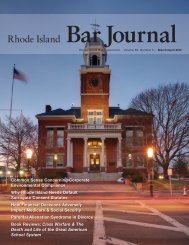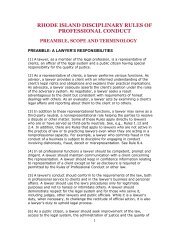Are We Taking The Sex Offender Label Too Far? - Rhode Island Bar ...
Are We Taking The Sex Offender Label Too Far? - Rhode Island Bar ...
Are We Taking The Sex Offender Label Too Far? - Rhode Island Bar ...
You also want an ePaper? Increase the reach of your titles
YUMPU automatically turns print PDFs into web optimized ePapers that Google loves.
Preserving Tax Incentives<br />
for Charitable Giving<br />
James S. Sanzi, Esq.<br />
<strong>Rhode</strong> <strong>Island</strong> Foundation<br />
Senior Development Officer<br />
…during a time<br />
when many families<br />
and charitable<br />
causes are as vulnerable<br />
as ever, to<br />
what extent<br />
should this longstanding<br />
financial<br />
incentive to give to<br />
charity be under<br />
such scrutiny?<br />
Remember the National Commission on Fiscal<br />
Responsibility and Reform, otherwise known<br />
as the President’s deficit commission? One of<br />
the many proposals in its December, 2010 final<br />
report was to eliminate the charitable deduction<br />
and replace it with a 12-percent credit, available<br />
only for contributions beyond 2 percent of a<br />
taxpayer’s adjusted gross income. Although the<br />
commission’s report was not ultimately adopted,<br />
the charitable deduction has certainly come under<br />
heightened scrutiny ever since (along with basically<br />
the entire tax code, given the economic<br />
times). Make no mistake, it is an understatement<br />
to say that times are tough and, as many of our<br />
political leaders opine, virtually nothing should<br />
be off the table. However, during a time when<br />
many families and charitable causes are as vulnerable<br />
as ever, to what extent should this longstanding<br />
financial incentive to give to charity<br />
be under such scrutiny? <strong>The</strong>se issues are ripe<br />
for discussion since proposals to reform the<br />
charitable deduction have gained momentum<br />
in the White House and on Capitol Hill. This<br />
article highlights some of the pros and cons of<br />
the debate.<br />
President Obama has criticized the current<br />
charitable deduction as favoring the wealthy,<br />
while providing no benefit to the typical middle-class<br />
family that doesn’t itemize. He has<br />
repeatedly argued for a cap on itemized deductions.<br />
In fact, at the time of this writing, the<br />
President’s recently-proposed jobs creation plan<br />
intends to finance the measure, in part, by<br />
reducing the tax benefit wealthier taxpayers<br />
receive from their itemized deductions, including<br />
the charitable deduction, to 28 percent.<br />
Furthermore, in Congress as recently as July, a<br />
bi-partisan group of Senators (remember the<br />
self-styled “Gang of Six”?) called for reform of<br />
the charitable deduction consistent with the recommendations<br />
made by the deficit commission.<br />
You may also recall that, although ultimately<br />
spared, the charitable deduction was again on<br />
the chopping block during the recent debt ceiling<br />
negotiations. When the new 12 member<br />
purported “super” committee meets over the<br />
next couple months to explore another $1.5 trillion<br />
in cuts, don’t be surprised to see the charitable<br />
deduction under fire again.<br />
Let’s first look at the commission’s particular<br />
proposal of eliminating the charitable deduction<br />
and replacing it with a non-refundable 12% tax<br />
credit available for all taxpayers for giving above<br />
2% of their adjusted gross income. Proponents<br />
of this reform primarily argue that applying the<br />
same credit percentage to all eligible taxpayers<br />
will treat taxpayers more equally than our current<br />
system of itemized charitable deductions.<br />
<strong>The</strong>y may have a point. First, high earners are<br />
more likely to itemize, and, obviously, one must<br />
itemize in order to take advantage of our current<br />
system of itemized deductions. Second, higher<br />
earners currently get a bigger tax deduction for<br />
their charitable contributions. A donor in the<br />
top federal tax bracket can get a 35% deduction<br />
for their gifts (35% being the top federal<br />
income tax rate). <strong>The</strong>refore, the after deduction<br />
cost of a donor’s $100 gift would be $65,<br />
assuming the donor itemizes. Compare this to<br />
a less wealthy donor in the 25% federal income<br />
tax bracket whose $100 gift effectively costs<br />
$75 after the deduction. An even lower earning<br />
donor who gives the same $100 might have an<br />
after deduction cost as high as $90. Fair?<br />
Maybe not if the wealthy and not so wealthy<br />
make the same size gift. However, given that<br />
larger gifts are typically made by wealthier<br />
donors, maybe the current system best encourages<br />
the potential for their larger gifts. Let the<br />
debate wage on.<br />
Now, what about the commission’s proposal<br />
that the credit would only be available for<br />
amounts beyond 2% of a taxpayer’s adjusted<br />
gross income (AGI)? Let’s look at one measure<br />
of giving in <strong>Rhode</strong> <strong>Island</strong> to assess this. Tax<br />
returns from 2007 show that, on average,<br />
<strong>Rhode</strong> <strong>Island</strong>ers contribute 1.54% of their AGI<br />
to charity (By the way, this measure puts our<br />
state 46th in the nation in charitable giving.).<br />
<strong>The</strong>refore, under the commission’s proposal,<br />
the average taxpayer in <strong>Rhode</strong> <strong>Island</strong> wouldn’t<br />
even get to claim the tax credit. In fact, using<br />
this Internal Revenue Service (IRS) data, the<br />
average taxpayers from 17 other states would<br />
also not be able to claim the credit (Illinois,<br />
Washington, Pennsylvania, Iowa, Massachusetts,<br />
<strong>Rhode</strong> <strong>Island</strong> <strong>Bar</strong> Journal November/December 2011 13
















